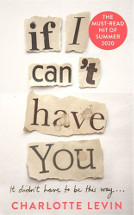If I can't have you by Charlotte Levin

Macmillan, 2020. ISBN: 9781529032383.
(Age: Adult) Charlotte Levin plunges us into the horror of a young
woman, Constance, riding on a London tram, wearing what appears to
be a blood-stained white dress. When a tooth drops out of her mouth
she is even more mortified but has no choice but to stay on the tram
so that she can go back to her own home. The passengers are silenced
by her condition, and no-one on the bus offers either help nor any
word of compassion. The narrative is told in the first person, as we
see from the title, as the narrator, Constance, reveals all of the
problems and the angst that she is experiencing. We are positioned
to gradually comprehend her loneliness, her history of the loss of
all family, and her mistreatment by, and obsession with, one man who
should know better.
We discover that she has no one to support her, in the way of family
or friends. She does have a job in a medical practice and it is this
that grounds her, to some extent, but also it is where the catalyst
arises that adds violence and trauma to her life. The doctor in the
practice where she works has behaved inappropriately, and she is
both obsessed by him and angry, and we hear of her angst as she
addresses him, as the 'you' in the narrative. When she finds an old
man whose flat overlooks the doctor's apartment, she visits him so
that she can spy on the doctor, yet unexpectedly she comes to care
for this lonely man, and he for her. When she realises that she has
become an important part of the older man's life, there is a dawning
recognition of her own kindness and a realisation that this may be
her chance to help someone else and to find meaning in her life.
The language is frequently harsh, coarse and angry, her words
plunging us into the darkness of her world. We are aware that the
behaviour of the doctor is most inappropriate, but he is depicted as
careless about the emotional well-being of others, having little
compunction about the appropriacy of his actions. Unsettling, richly
descriptive of the loneliness that is her reality, and of her
physical and sexual encounters, this novel is not for the
faint-hearted. While Charlotte Levin evokes a world that few of us
would wish for, she elicits a sense of deep compassion for the
woman, and evokes a notion of the terrible loneliness that some
people experience. It would be appropriate for adults and older
adolescent readers and is not suitable for younger adolescents.
Elizabeth Bondar